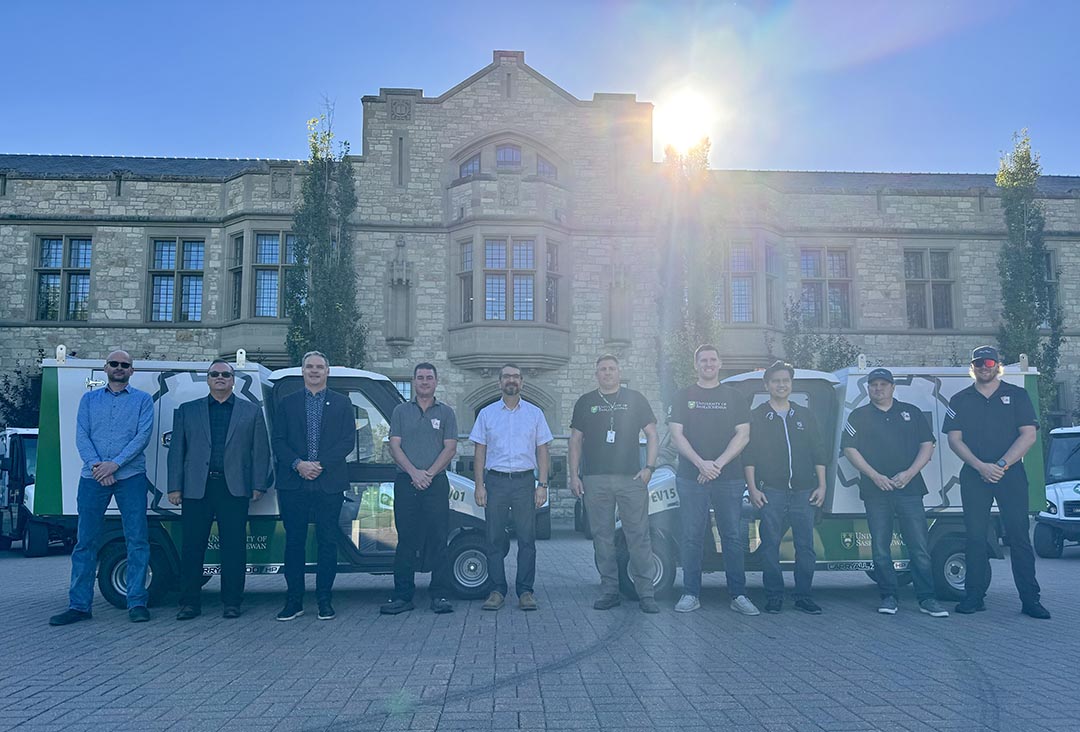
USask unveils new fleet of electric vehicles
There is an extra buzz on campus this fall with a new fleet of electric vehicles (EVs) taking to the roadways around the University of Saskatchewan’s (USask) Saskatoon campus.
By University CommunicationsUSask recently took delivery of 15 customized electric Club Cars that will be used by the Facilities team, reducing the dependence on the current fleet of gas-powered vehicles. The concept of purchasing EVs came from the Facilities team’s strategic plan, which included a review of the university’s current fleet of vehicles to identify ways to reduce both costs and carbon emissions.
“As part of our review, we investigated alternative vehicle options that have the ability to create efficiencies, reduce operating costs, and meet our sustainability targets,” said Troy Linsley, director of Facilities.
After consulting with suppliers and analyzing options, Facilities decided to move forward with the small EVs that were custom designed to meet the university’s specific needs.
“The Club Car EVs allow the operators to better navigate the campus and drive directly to where they need to work. They are versatile, easily configurable, reduce our carbon footprint, and are cost-effective,” said Linsley.
To select the right vehicle that would meet the specific needs of the university, the Facilities team partnered with Ace of Carts, a local supplier of Club Car an industry leader that specializes in custom electric carts that are used in a broad range of industries.
“Ace of Carts and Club Car have been valued partners through the entire experience. We worked together to determine a vehicle that would meet our needs, work within our climate, and perform the way we need them to,” Linsley said. “They worked with us through each step of the process assisting with the training, the implementation, and the rollout. The partnership was built on utilizing their industry experience, not only with small EVs but also in other industries and applications.”

Currently Facilities manage a fleet of nearly 100 traditional gas- or diesel-powered vehicles including full-sized vans, small vans, cube trucks, dump trucks, half- and quarter-ton trucks, loaders and skid steers. On average the fleet uses approximately 5,000 litres of fuel per month. The purchase of 15 new EV’s is the beginning of a transition to increased use of electric-powered vehicles.
“The reduction in fuel consumption by operating the EVs will be impactful compared to using full-size vans,” said Linsley. In addition to reducing fuel consumption and carbon emissions the EVs offer additional financial benefits.
“The new EVs have significantly lower maintenance requirements compared to the gas vehicles which means less down time, less cost of repairs, and less loss of productivity,” said Linsley.
The full fleet of EVs has been in operation for the past couple of weeks and the initial reviews from their operators have been overwhelmingly positive.
“The versatility of the new EV’s allows for staff to drive right up to where they are working rather than at loading docks, or service entrances. The ability to drive on shared pathways and grassed areas further increases where they can be used,” said Linsley.
Currently, about 30 members of the Facilities team have completed the required Power Mobile Equipment training to operate the vehicles. The training program was developed to meet the necessary regulatory requirements and included in-class training, a written exam and hands-on operation of the vehicles. Facilities predicts that in the coming year the number of trained operators will increase to 100 as they expand the use and the application of these new EVs.
Over the coming months, the Facilities team will closely monitor the EV program and record data used to identify additional opportunities to expand the use of EVs across campus.
“This is an exciting first step in what we are sure will be the start of growing a more robust EV program at USask,” said Linsley.
Together we will support and inspire students to succeed. We invite you to join by supporting current and future students' needs at USask.

